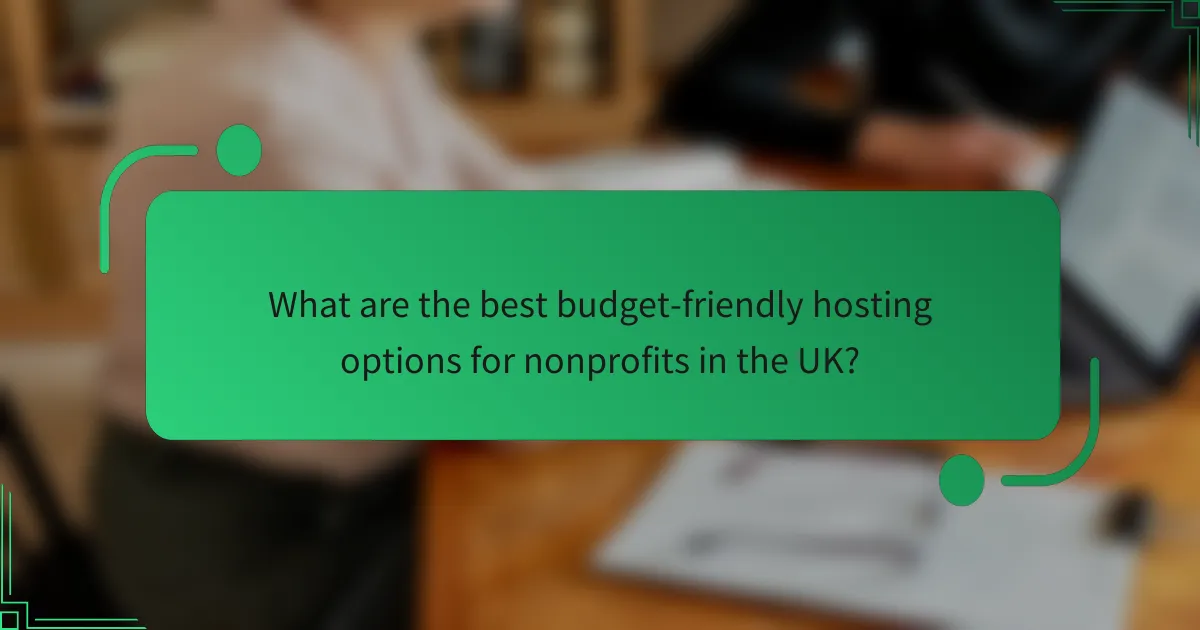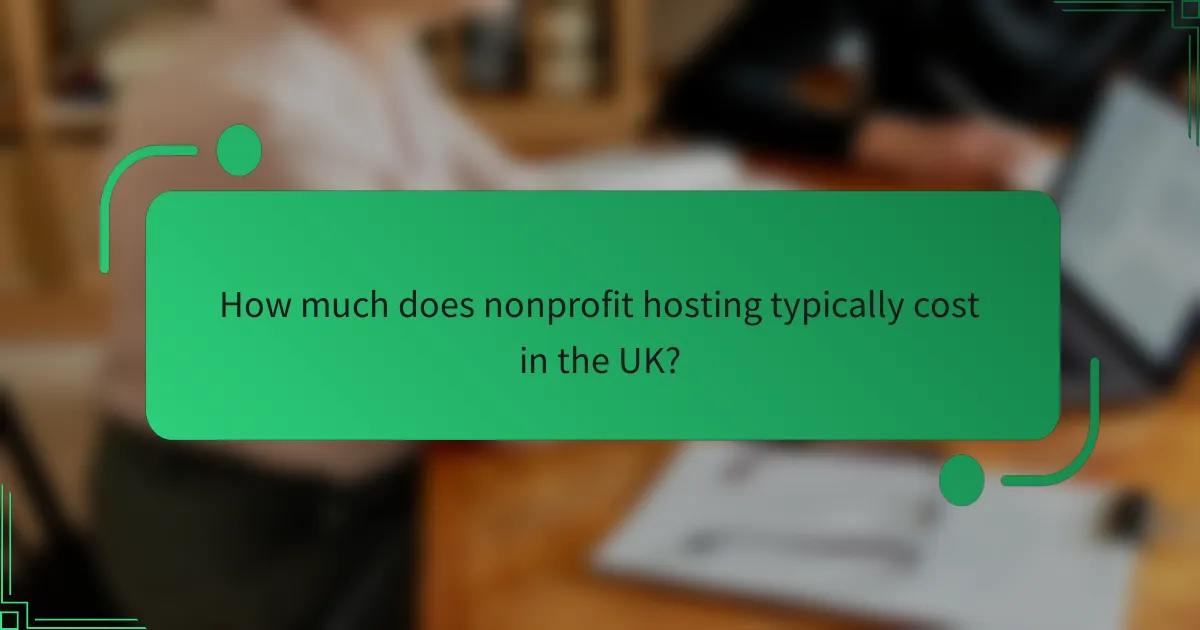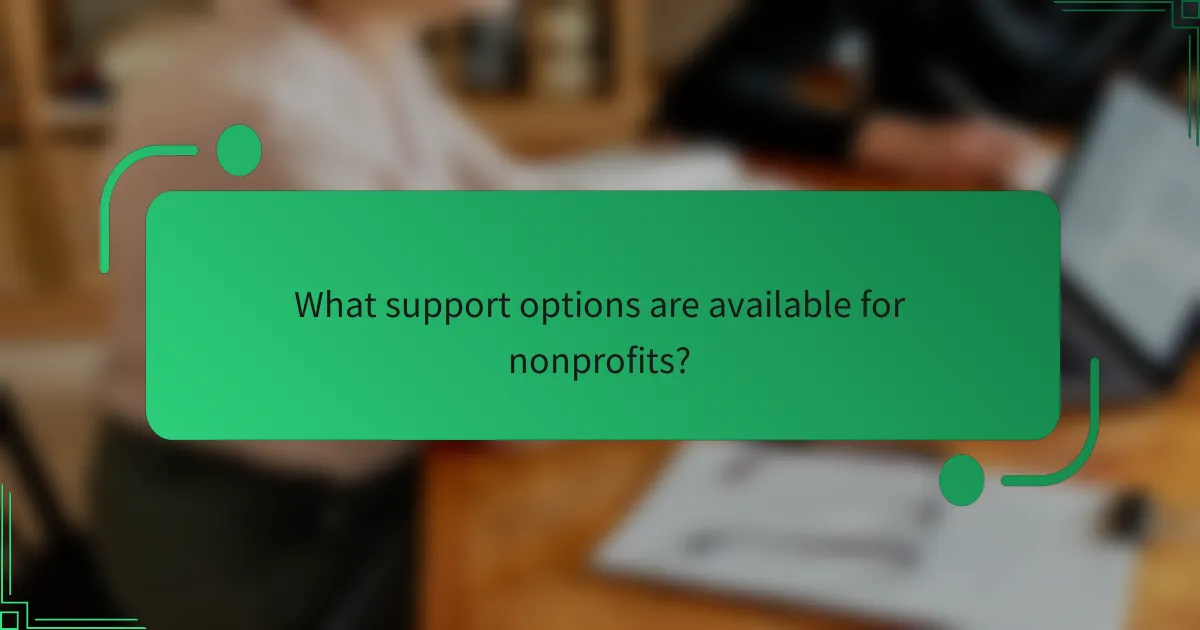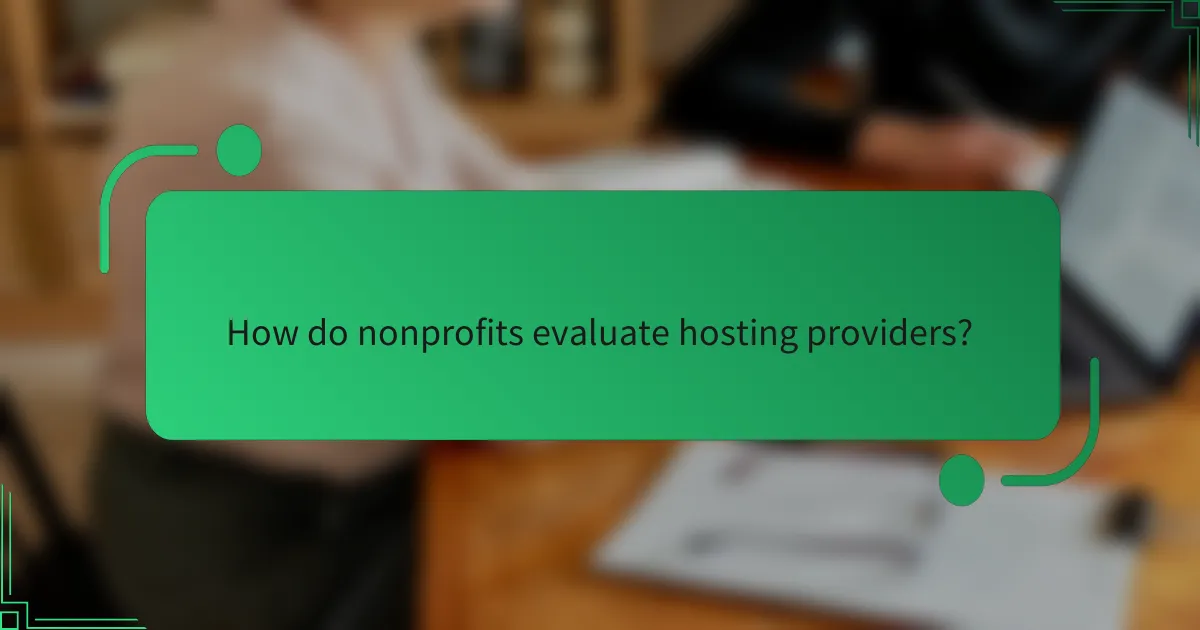For nonprofits in the UK, selecting a budget-friendly hosting provider is crucial for maintaining an online presence without straining finances. It’s important to look for services that offer essential features such as scalability, security, and reliable customer support, all while keeping costs manageable, typically ranging from £5 to £30 per month. Many hosting companies provide special discounts and tailored packages specifically designed for charitable organisations, ensuring they receive the support they need to thrive.

What are the best budget-friendly hosting options for nonprofits in the UK?
For nonprofits in the UK, budget-friendly hosting options include providers that offer reliable services at affordable prices, often with special discounts for charitable organisations. Key features to consider are customer support, uptime guarantees, and scalability to accommodate growing needs.
SiteGround
SiteGround is known for its excellent customer support and high performance. They offer a range of plans starting from around £3 per month, which include features like daily backups and free SSL certificates, essential for maintaining security.
Nonprofits can benefit from SiteGround’s user-friendly interface and one-click installations for popular content management systems like WordPress. Their commitment to uptime and speed makes them a solid choice for organisations looking to create an impactful online presence.
Bluehost
Bluehost offers hosting plans starting at approximately £2.50 per month, making it an attractive option for nonprofits. They provide a free domain for the first year and a free SSL certificate, which helps in establishing trust with visitors.
With 24/7 customer support and a user-friendly control panel, Bluehost is suitable for those who may not have extensive technical knowledge. Their integration with WordPress is seamless, allowing nonprofits to set up their sites quickly.
Hostinger
Hostinger is one of the most affordable hosting providers, with plans starting as low as £1.99 per month. They offer a variety of features, including a website builder and free SSL, which are beneficial for nonprofits on a tight budget.
Despite its low cost, Hostinger maintains good performance and uptime. Nonprofits should consider their customer support options, which are primarily online, as this may affect those who prefer direct communication.
DreamHost
DreamHost provides a range of hosting solutions starting at around £2.59 per month, with a focus on reliability and customer service. They offer a 97-day money-back guarantee, which is advantageous for nonprofits wanting to test the service without a long-term commitment.
DreamHost includes features like unlimited bandwidth and storage, which can accommodate growing websites. Their commitment to sustainability may also resonate with environmentally conscious nonprofits.
GreenGeeks
GreenGeeks stands out for its eco-friendly approach, offering hosting plans starting at about £2.95 per month. They invest in renewable energy, making them a great choice for nonprofits focused on sustainability.
With features like free SSL certificates and nightly backups, GreenGeeks provides essential tools for maintaining a secure and reliable website. Their customer support is available 24/7, ensuring help is accessible whenever needed.

What features should nonprofits look for in hosting?
Nonprofits should seek hosting providers that offer essential features tailored to their unique needs, including scalability, security measures, uptime guarantees, and reliable customer support. These elements ensure that the hosting service can grow with the organisation, protect sensitive data, maintain website availability, and provide assistance when needed.
Scalability
Scalability is crucial for nonprofits as it allows their hosting service to adapt to changing traffic levels and resource needs. Look for providers that offer flexible plans, enabling easy upgrades or downgrades based on your organisation’s growth or seasonal traffic spikes.
Consider cloud hosting options, which typically provide better scalability than traditional shared hosting. This setup allows you to pay only for the resources you use, making it a cost-effective choice for fluctuating demands.
Security measures
Security is paramount for nonprofits, especially when handling sensitive donor information. Ensure the hosting provider offers robust security measures, such as SSL certificates, firewalls, and regular backups to protect your data from breaches and loss.
Additionally, inquire about compliance with regulations like GDPR if your organisation operates in Europe. A provider that prioritises security will help safeguard your reputation and maintain donor trust.
Uptime guarantees
Uptime guarantees indicate the reliability of a hosting service. Nonprofits should aim for a provider that offers at least 99.9% uptime, ensuring that their website remains accessible to visitors and donors at all times.
Check for service level agreements (SLAs) that outline compensation for downtime. This can provide peace of mind, knowing that your hosting provider is accountable for maintaining high availability.
Customer support
Reliable customer support is essential for nonprofits, particularly if technical issues arise. Look for hosting providers that offer 24/7 support through multiple channels, such as live chat, phone, and email.
Evaluate the quality of support by reading reviews and checking response times. A provider with knowledgeable and responsive support can help resolve issues quickly, minimising disruptions to your online presence.

How much does nonprofit hosting typically cost in the UK?
Nonprofit hosting in the UK generally costs between £5 to £30 per month, depending on the features and support offered. Many providers cater specifically to nonprofits, offering tailored packages that can help organisations manage their budgets effectively.
Monthly pricing ranges
Monthly prices for nonprofit hosting can vary significantly based on the service level and resources included. Basic shared hosting plans may start as low as £5, while more robust options with additional features, such as enhanced security and support, can reach up to £30 or more per month.
It’s essential to evaluate what each plan offers. For instance, a plan at the lower end may suffice for a small organisation, while larger nonprofits might require more comprehensive solutions that justify the higher cost.
Annual discounts
Many hosting providers offer annual payment options that can result in substantial savings. Nonprofits can often find discounts of 10% to 20% when they commit to a yearly plan instead of paying monthly.
When considering an annual plan, review the terms carefully to ensure that the features you need are included and that you won’t face unexpected charges later on.
Hidden fees
Be cautious of hidden fees that can inflate the overall cost of hosting. Common additional charges may include setup fees, domain registration, and costs for exceeding bandwidth limits.
Before committing, read the fine print and ask the provider about any potential extra costs. This diligence can help you avoid surprises and ensure your budget remains intact.

What support options are available for nonprofits?
Nonprofits can access various support options tailored to their needs, ensuring they receive assistance when required. These options typically include round-the-clock customer service, dedicated support teams for nonprofits, and community forums where users can share experiences and solutions.
24/7 customer service
Many budget-friendly hosting providers offer 24/7 customer service, which is crucial for nonprofits that may operate outside of traditional hours. This means you can get help at any time, whether it’s a technical issue or a billing question.
When selecting a hosting provider, check if they offer multiple channels for support, such as phone, live chat, and email. Quick response times are essential; aim for providers that guarantee responses within a few minutes to an hour.
Dedicated nonprofit support
Some hosting companies provide dedicated support specifically for nonprofit organisations. This can include tailored advice on optimising your website for fundraising or outreach efforts.
Look for providers that understand the unique challenges nonprofits face, such as budget constraints and the need for effective communication tools. Dedicated support can often lead to more relevant solutions and quicker resolutions to issues.
Community forums
Community forums are an excellent resource for nonprofits, allowing users to connect with others facing similar challenges. These forums often contain valuable insights, tips, and best practices shared by fellow nonprofit professionals.
Participating in these forums can help you learn from others’ experiences, ask questions, and find solutions without needing direct support. Make sure to engage actively, as this can lead to building a network of support within the nonprofit community.

What are the prerequisites for choosing a hosting provider?
When selecting a hosting provider, nonprofits should consider their specific needs, budget constraints, and the level of technical support required. Understanding these prerequisites helps ensure the chosen service aligns with the organisation’s goals and operational capabilities.
Assessing website needs
Start by identifying the primary purpose of the website. Is it to provide information, facilitate donations, or engage with the community? Knowing the website’s goals will guide decisions on features like storage, bandwidth, and content management systems.
Consider the expected traffic volume. For many nonprofits, this may vary significantly based on campaigns or events. A hosting plan that accommodates growth, such as scalable options, can be beneficial.
Understanding technical requirements
Technical requirements include the type of website being built, such as static or dynamic, and the technologies involved. For example, if using WordPress, ensure the hosting provider supports PHP and MySQL.
Evaluate the need for security features, such as SSL certificates and regular backups. Nonprofits often handle sensitive data, so robust security measures are essential to protect both the organisation and its supporters.

How do nonprofits evaluate hosting providers?
Nonprofits evaluate hosting providers by considering key factors such as cost, features, support, and reliability. They often look for services that offer the best value while meeting their specific needs, ensuring that their limited budgets are effectively utilised.
Comparative reviews
Comparative reviews are essential for nonprofits to assess different hosting providers side by side. These reviews typically highlight features, pricing, customer support, and performance metrics, allowing organisations to make informed decisions based on their unique requirements.
When reading comparative reviews, nonprofits should focus on aspects like uptime guarantees, scalability options, and any additional services included, such as website builders or security features. This helps in identifying which providers offer the best overall package for their budget.
It’s beneficial to consult multiple sources for reviews, including nonprofit-focused forums and technology blogs. This ensures a well-rounded understanding of each provider’s strengths and weaknesses, ultimately leading to a more suitable choice for the organisation’s hosting needs.